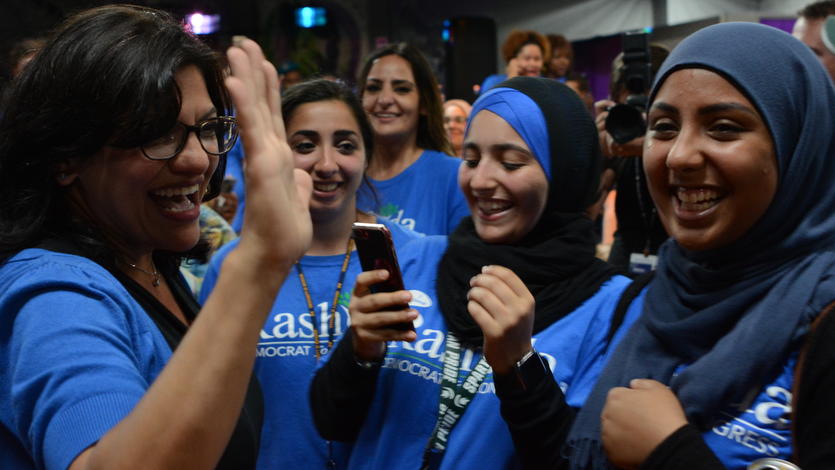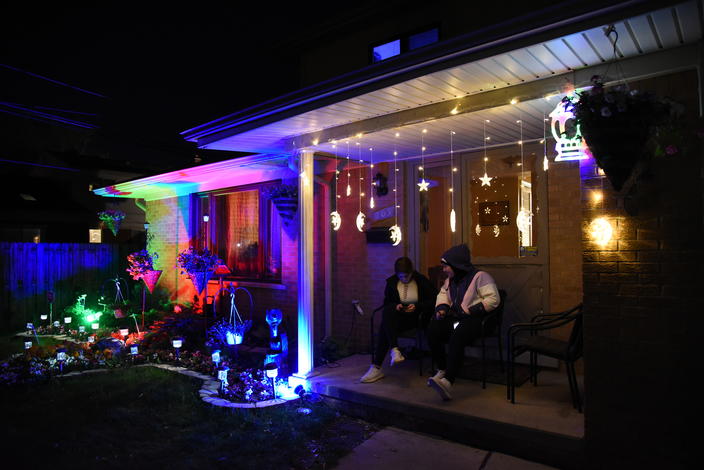
This article was originally published on January 14, 2020.
Culture is the way people find a sense of community and belonging. The Halal Metropolis Exhibition explores the many ways in which the Muslim communities of Metro Detroit contribute to the culture of the region and vice versa.
In Dearborn, this can be seen in the way a Christmas tree is repurposed into a crescent moon to celebrate Ramadan. Or in the line of customers waiting at Al Joom’s BBQ for that special cut of halal brisket. Or in the brightly embellished Sanaani dresses Yemeni women wear for local weddings with the latest scarves from Haute Hijab.
Most people know that Dearborn has the largest concentration of Muslims in the U.S. — the city’s Muslims were recently featured on The Simpsons and in many a Twitter feed — but there are many things not known about the ways in which Muslim culture is shaping and being shaped by the larger culture of the region. That’s where Halal Metropolis comes in.
The exhibition series, created by UM-Dearborn’s Center for Arab American Studies Director Sally Howell, U-M Associate Professor or Art Osman Khan and local documentarian Razi Jafri, explores the ways Muslim American culture and metro Detroit culture are now being created dialogically - especially in Dearborn where Muslims practice their faith and live their everyday lives in a community that comfortably accommodates them. Focusing on the visibility of local Muslim cultural practices, the exhibit has traveled to Detroit, Hamtramck, and Howell already, and now the ever-evolving installation has come to Dearborn.
Opening Friday, Halal Metropolis can be experienced on the Mardigian Library’s first floor’s Stamelos Gallery Center through April 3. An Opening Reception will take place from 5 to 7 p.m. Friday. The event is free and open to the public, complimentary hors d’oeuvres and refreshments will be served.
The exhibition includes home videos from the late 1950s and early ‘60s of a Dearborn family visiting the Ford Rotunda’s Christmas Fantasy, celebrating Thanksgiving and Eid, and relaxing at Camp Dearborn. Works from local Muslim artists are featured. And there is a historical display of news clippings, photos and memorabilia, including a 1919 poster announcing plans to build Michigan’s first mosque in Highland Park.
“My last book focused on the history of mosques,” says Howell, “but my recent work looks instead at things outside the mosques - at the contributions Muslims are making in socioeconomic, cultural, and political spheres.“This exhibit shows the deep roots that Muslims have here. I feel it is important for us to recognize the neighborhoods and communities where Muslims can practice their faith freely, but to also look beyond the Muslimness of these spaces, to see the many other qualities they represent. Our project looks at the food, politics, cultural celebrations, art — whatever allows someone to express their full selves in these halal spaces.”

Jafri (‘05 B.S.), who grew up Downriver, spent the past week meticulously arranging portraits from floor to ceiling on the wall. They are images he took of local residents (some in CASL’s JASS Studio) stepping out for the holidays in eye-catching clothing.
“It’s the intersection of fashion, modesty and consumerism: Three things that you normally don’t associate together. Look at this man. He has Burbery trim on his keffiyeh. He embodies hip hop, Arab culture, high fashion and modesty — all in one. Muslims are influenced by the world around them, just like Muslims are influencers,” Jafri says, mentioning how actor Rami Malek won a Golden Globe a few days prior. “Through art, I want to create an awareness about our community that is frequently misunderstood, misrepresented and underrepresented in the media and in American culture, yet has a huge impact on American culture. Sharing culture is a way to reach hearts and minds.”
Jafri says reaching out to others is something he began to do after 9/11 when he was a UM-Dearborn sophomore. He recalls feeling shocked and scared, but that was the first trauma. The second trauma was the Islamophobia that followed. He looked for ways to educate and keep lines of communication open for dialogue here on campus. He served as the education chair for the Muslim Student Association, took part in the campus’ Pluralism Project, and founded a campus chapter of Americans for Informed Democracy.
“I was barely 20, but I saw that it wasn’t about religion, the prejudice was appearance based — about being perceived as Muslim. Someone could be a Sikh and get shot and killed because of how you looked. People fear what and who they do not know. My goal was, and still is, to share that we are people who want the best for our families, neighborhoods and communities just like everyone else. And look what wonderful culture — art, fashion, food, music — we are creating in the process.”
Howell, who has worked in the Dearborn community for more than 30 years, says there are so many aspects to this exhibit that non-Muslims and Muslims both will learn something new. It might be that Orville Hubbard liked raw kibbe. About the work of a new favorite artist. Or a newfound appreciation of how the Dearborn of today came to be. Or, possibly, a stronger connection to our community and the people within it.
“It’s foundational to American culture to say we are made up of people who have come from different places and that our nation is built on the idea of liberty and justice for everyone. But there is a tension inherent in these words when we recognize that they have never been applied they universally. Muslims have been here since the country’s founding. They have deep roots in this community especially where they have created thriving neighborhoods, schools and economies, despite facing many challenges. They’ve given and continue to give a tremendous amount and they have a great story to tell.”
For more information, go to the Halal Metropolis website.
Upcoming educational Gallery talks are:
-
6 to 8 p.m. Thursday, Jan. 23: Making the Halal Metropolis Project
-
6 to 8 p.m. Thursday, Feb. 6: Culinary Pioneers
-
6 to 8 p.m. Thursday, Feb. 20: Fashion Influencers
-
6 to 8 p.m. Thursday, March 12: Dearborn Foodies
-
6 to 8 p.m. Thursday, March 26: Innovating the Halal Holiday







